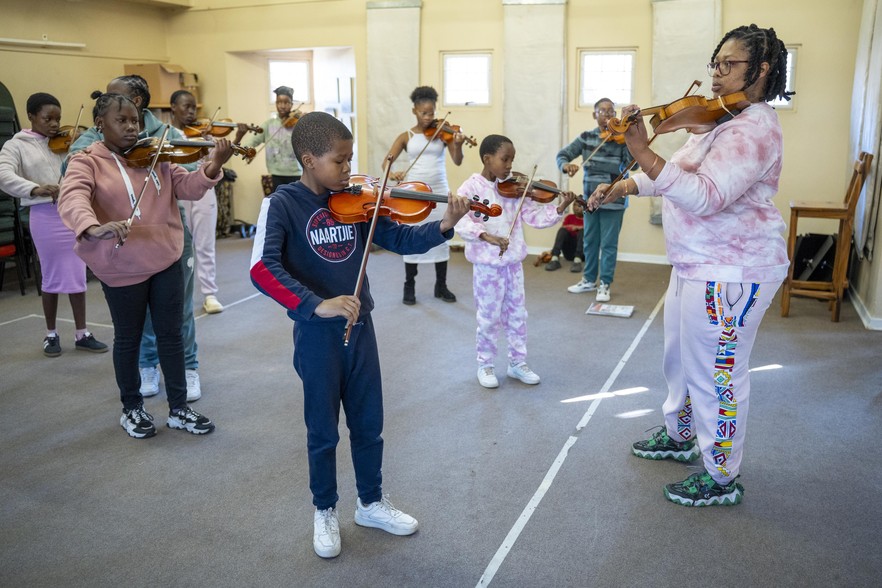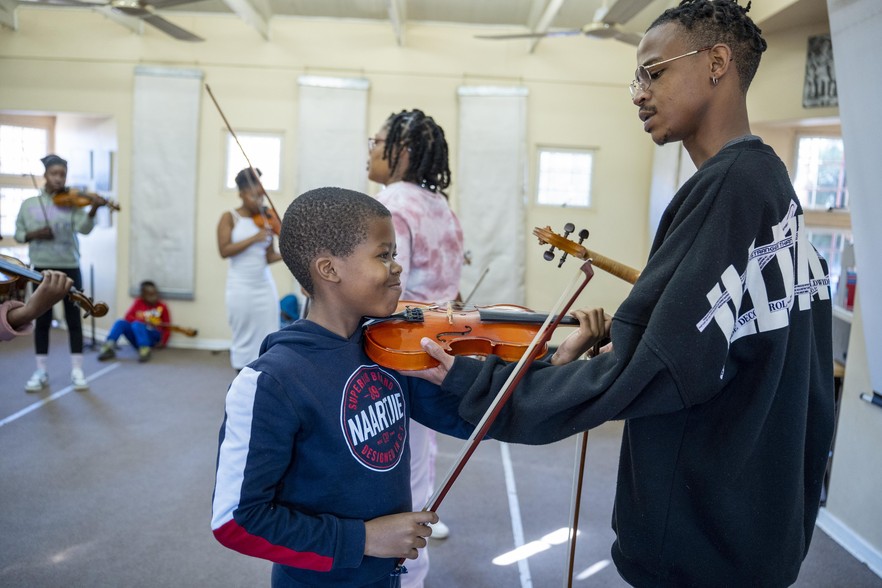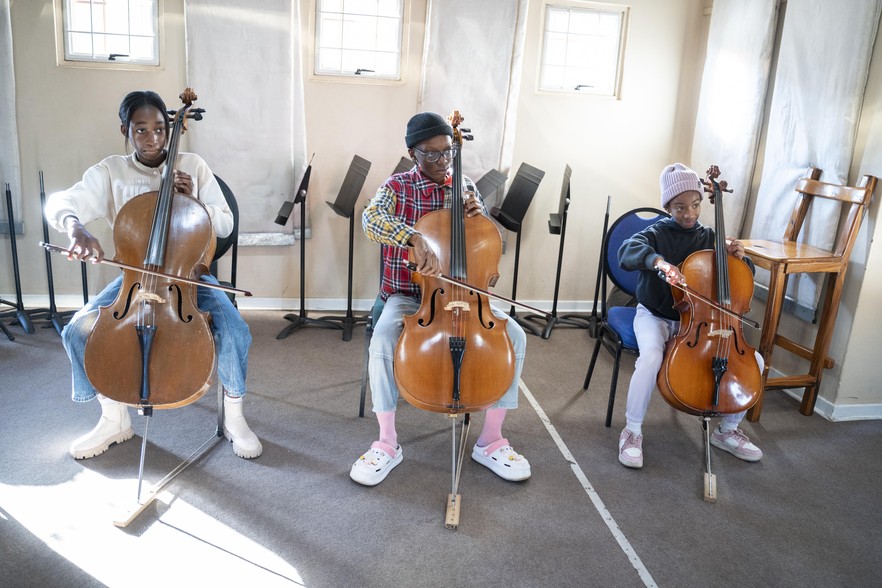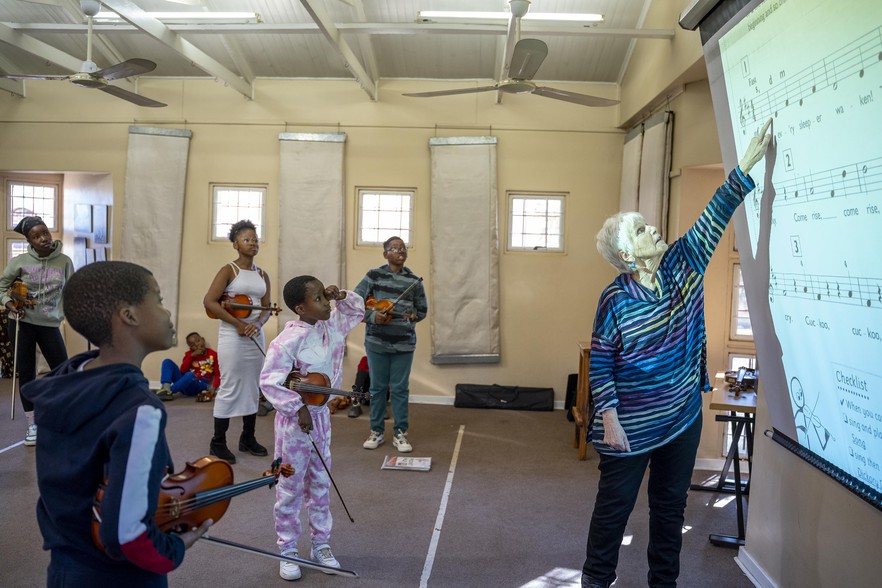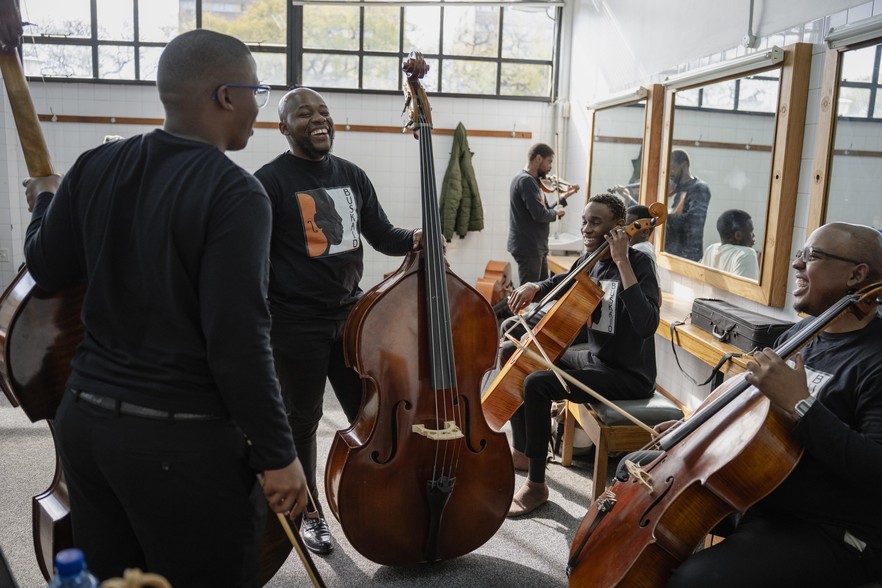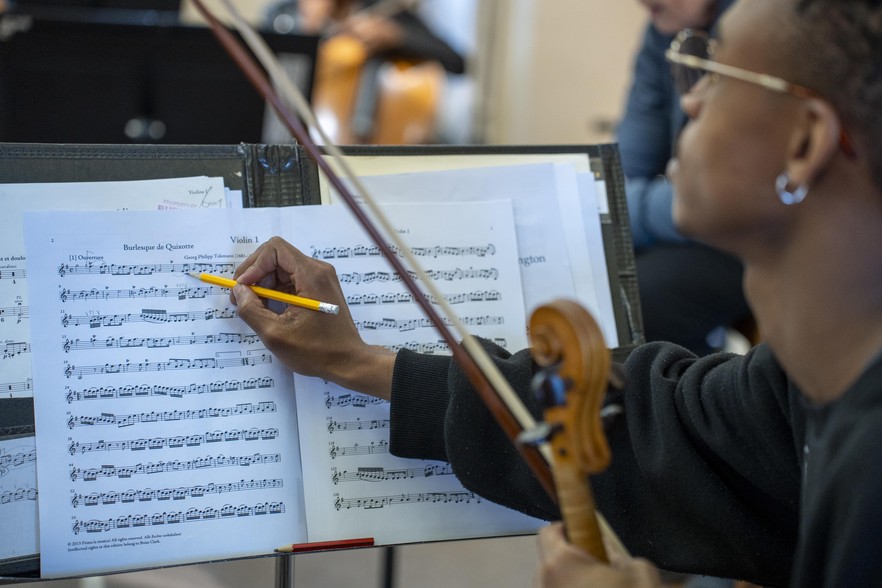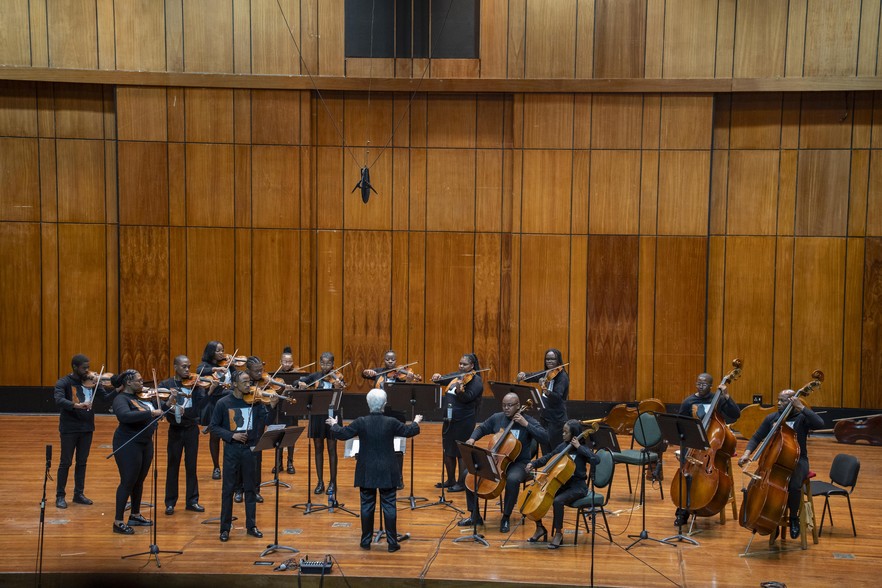World-famous Soweto music school faces funding crisis
“We’ve survived under so many difficult circumstances but we’ve never been in the situation that we are in now”
Keabetswe Goodman, who was once a student at Buskaid, gives a lesson to a group of young violin students. Photos: Ihsaan Haffejee
Buskaid, the music school based in Diepkloof, Soweto, has overcome many challenges in its 28-year existence. But now, says founder Rosemary Nalden, the school, which hosts the famous Soweto Strings Ensemble, faces its worst challenge yet.
“We’ve survived HIV, we’ve survived Covid, we’ve survived under so many difficult circumstances but we’ve never been in the situation that we are in now. We are at the bottom of our funding and this has never happened in the history of Buskaid,” Nalden told GroundUp.
The project costs between R4.5-million and R5-million a year to run, she said.
Tshidiso Boikanyo shows a young student how to hold his violin.
Nalden, who was born in the UK but now calls South Africa home, started the school in 1997 to provide classical music education to youngsters in Soweto. Over the years she and her team have trained dozens of young players, many of whom are now professional players of string instruments. Some teach at Buskaid, passing on the skills they learned to a new generation of violin, viola, cello and double-bass players.
Learning a string instrument requires high levels of dedication and discipline, with studies showing that it can help brain development.
From left to right, cello players Leano Mahapa, Katlego Nare and Galalestsang Mathobela play during a lesson at Buskaid.
Keabetswe Goodman was a child when she started learning the violin at Buskaid in 1999. Under the guidance of Nalden, she developed into a professional musician and now works at Buskaid as a teacher.
Currently the school has about 80 students but there is a waiting list of around 70 children wanting to join the programme, according to Nalden.
Buskaid founder Rosemary Nalden gives a violin lesson.
The Buskaid String Ensemble has toured internationally dozens of times, and has been identified by UK Gramophone Magazine as one of the world’s 10 most inspirational orchestras, alongside the London Symphony Orchestra and the New York Philharmonic. The orchestra has performed for Nelson Mandela, President Cyril Ramaphosa, and Michelle Obama.
Members of the ensemble warm up before a performance at the Linder auditorium.
There are about 30 people on the payroll, including teachers, the musicians at the Buskaid Soweto String Ensemble, and other staff.
“We would like to have another intake of kids and increase it to 100 but this requires more funding,” said Nalden.
Tshidiso Boikanyo, the lead violin player with the Buskaid Soweto String Ensemble, makes some notes on a sheet of music during a rehearsal before the performance.
Singer Sibongile Mngoma recently performed alongside the Buskaid Soweto String Ensemble at their annual concert at the Linder auditorium in Johannesburg.
Mngoma says that grassroots institutions like Buskaid do more for communities than just music education. “A lot of these kids have been saved from a life of crime and addiction. Places like Buskaid allow them to reach their full potential and become the best version of themselves,” said Mngoma.
Buskaid founder Rosemary Nalden conducts the Buskaid Soweto String Ensemble at a concert at the Linder auditorium in Johannesburg.
But the concerts are expensive to put on and Nalden is worried. Since 2022, Buskaid has not had any government funding. The project relies on corporate and philanthropic donations, some of which dried up during Covid. Nalden says new sources of funds are needed for the project to be sustainable.
Support independent journalism
Donate using Payfast

Don't miss out on the latest news
We respect your privacy, and promise we won't spam you.
Next: Violent crime on Table Mountain is increasing, volunteers warn
Previous: Gqeberha protesters block busy road, demanding better land
Letters
Dear Editor
Groundup recently featured an article about the Buskaid Music School and its current financial crisis. We are most grateful for the exposure which this has given both us and arts organisations in general. I think many of my colleagues in the sector would agree that we are all experiencing some of our greatest financial challenges in living memory.
Unfortunately, your excellent article gave the impression that Buskaid will have to close its doors at the end of this financial year, namely February 2026. This is not the case, and it is very important that we put the record straight.
Over the years Buskaid built up an emergency investment fund, established after a successful tour to the USA in 2001. This fund has been used on certain occasions: for example, when Lottery has paid us late and we have been able to "borrow" money to continue the programme it was supporting, which we have later paid back into the investment.
For the first time in 25 years, we are having to drain this fund in order to continue our activities. There is enough left to last us until February 2026.
However, we are incredibly fortunate to have two independent charitable trusts, based in the USA and the UK, both of whose missions are to support Buskaid’s activities in South Africa. Buskaid UK is currently able to come to our rescue and support us during this crisis, although it must be emphasised that their assistance is finite. Together with the support of loyal and generous South African corporates and trusts, whose contributions we hope will continue, this means that we shall not be closing our doors next year.
But it should be pointed out that Buskaid is a South African-based organisation, which enriches the lives of children and young people in Soweto, by offering world-class string tuition enabling them to play music of all genres, as well as empowering them to earn a living through Buskaid’s job-creation programmes. It has literally saved lives! Should such an organisation have to depend on overseas support? Relative to its huge impact on the community within which it operates, as well as its impact on civil society in general, its budget is pitifully low. Currently, because of misguided judgments about how government should use the limited resources available to support the Arts and Arts Education, we are not even considered as worthy of Government support. A comprehensive proposal to a government entity, submitted in January 2025, was summarily rejected a couple of months later, when the guidelines were changed in such a way as to exclude Buskaid’s activities.
My point is that, whilst we are most fortunate that a UK Trust is helping to sustain us, we should not have to be dependent on overseas funding!
Pastoral care for children suffering personal trauma, the academic benefits of a musical education, life-skills training, and economic empowerment – all these are on offer at Buskaid and have been for the past 28 years. Our corporate sponsors and trusts have stood by us during this long and incredible journey of local and international success. With the support of successive Boards of enlightened trustees, we have a proven track record of good governance, wise and responsible expenditure – not to mention huge acclaim, both locally and internationally.
We are indebted to GroundUp for giving us the opportunity to share Buskaid’s personal dilemma, and to highlight the parlous state of all arts organisations in South Africa.
© 2025 GroundUp. This article is licensed under a Creative Commons Attribution-NoDerivatives 4.0 International License.
You may republish this article, so long as you credit the authors and GroundUp, and do not change the text. Please include a link back to the original article.
We put an invisible pixel in the article so that we can count traffic to republishers. All analytics tools are solely on our servers. We do not give our logs to any third party. Logs are deleted after two weeks. We do not use any IP address identifying information except to count regional traffic. We are solely interested in counting hits, not tracking users. If you republish, please do not delete the invisible pixel.

